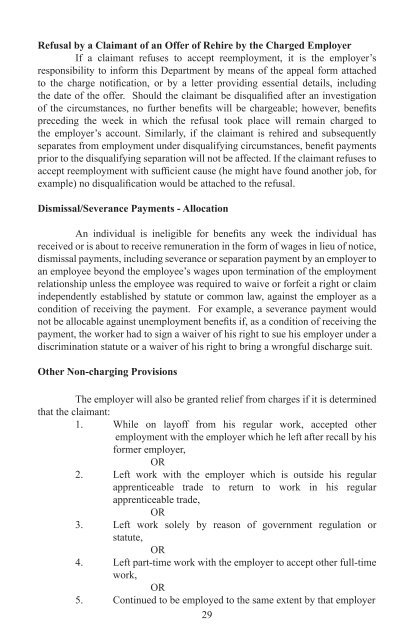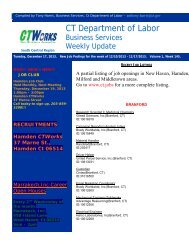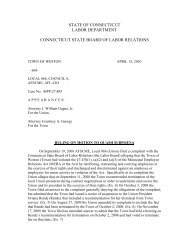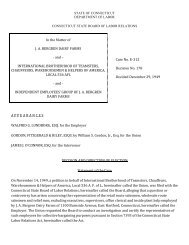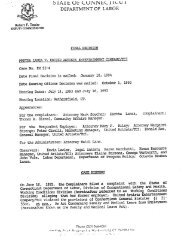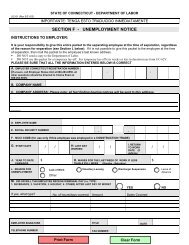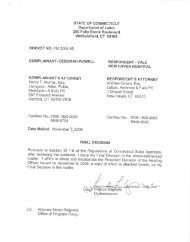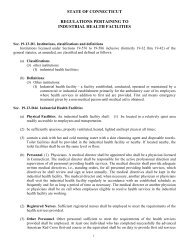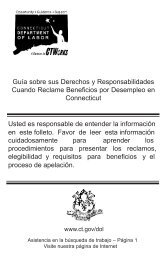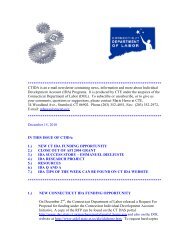Employer's Guide to Unemployment Compensation - Connecticut ...
Employer's Guide to Unemployment Compensation - Connecticut ...
Employer's Guide to Unemployment Compensation - Connecticut ...
Create successful ePaper yourself
Turn your PDF publications into a flip-book with our unique Google optimized e-Paper software.
Refusal by a Claimant of an Offer of Rehire by the Charged Employer<br />
If a claimant refuses <strong>to</strong> accept reemployment, it is the employer’s<br />
responsibility <strong>to</strong> inform this Department by means of the appeal form attached<br />
<strong>to</strong> the charge notification, or by a letter providing essential details, including<br />
the date of the offer. Should the claimant be disqualified after an investigation<br />
of the circumstances, no further benefits will be chargeable; however, benefits<br />
preceding the week in which the refusal <strong>to</strong>ok place will remain charged <strong>to</strong><br />
the employer’s account. Similarly, if the claimant is rehired and subsequently<br />
separates from employment under disqualifying circumstances, benefit payments<br />
prior <strong>to</strong> the disqualifying separation will not be affected. If the claimant refuses <strong>to</strong><br />
accept reemployment with sufficient cause (he might have found another job, for<br />
example) no disqualification would be attached <strong>to</strong> the refusal.<br />
Dismissal/Severance Payments - Allocation<br />
An individual is ineligible for benefits any week the individual has<br />
received or is about <strong>to</strong> receive remuneration in the form of wages in lieu of notice,<br />
dismissal payments, including severance or separation payment by an employer <strong>to</strong><br />
an employee beyond the employee’s wages upon termination of the employment<br />
relationship unless the employee was required <strong>to</strong> waive or forfeit a right or claim<br />
independently established by statute or common law, against the employer as a<br />
condition of receiving the payment. For example, a severance payment would<br />
not be allocable against unemployment benefits if, as a condition of receiving the<br />
payment, the worker had <strong>to</strong> sign a waiver of his right <strong>to</strong> sue his employer under a<br />
discrimination statute or a waiver of his right <strong>to</strong> bring a wrongful discharge suit.<br />
Other Non-charging Provisions<br />
The employer will also be granted relief from charges if it is determined<br />
that the claimant:<br />
1. While on layoff from his regular work, accepted other<br />
employment with the employer which he left after recall by his<br />
former employer,<br />
OR<br />
2. Left work with the employer which is outside his regular<br />
apprenticeable trade <strong>to</strong> return <strong>to</strong> work in his regular<br />
apprenticeable trade,<br />
OR<br />
3. Left work solely by reason of government regulation or<br />
statute,<br />
OR<br />
4. Left part-time work with the employer <strong>to</strong> accept other full-time<br />
work,<br />
OR<br />
5. Continued <strong>to</strong> be employed <strong>to</strong> the same extent by that employer<br />
29


